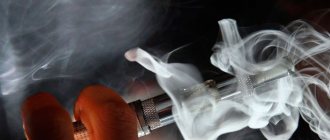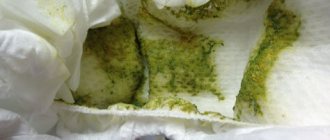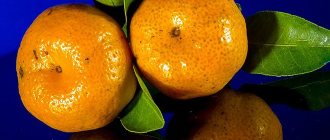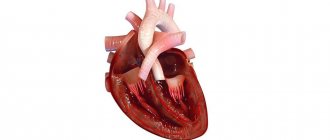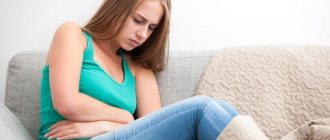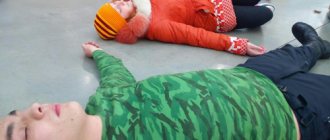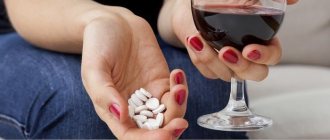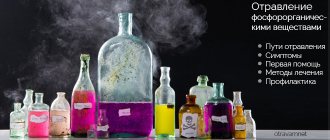Toxic substances entering the blood can cause many unpleasant sensations, including headaches
Headache is a very unpleasant condition that is familiar to almost every person. Doctors identify many different causes of this pathological condition. Among them are vascular disorders, inflammatory diseases, stress, and head injuries. One of the common causes of headaches is intoxication.
Types of intoxication and headache
Intoxication headaches are caused by increased levels of toxins in the blood. And an increase in this level, in turn, happens for many reasons.
- Infectious diseases and headaches. Infectious agents enter the body and begin to produce substances of their vital activity, which are toxins for the human body. The symptoms of any acute respiratory disease are practically a picture of poisoning: chills, muscle aches, headache, and often nausea and vomiting. All this indicates the presence of a virus or infectious agents in the blood and their metabolic products there.
- Food poisoning and headache. In this case, toxic poisonous substances enter the body through the stomach and intestines, from there they are absorbed into the blood. Further, the process of intoxication is the same as for diseases of an infectious nature.
- Kidney and liver diseases and headache. Chronic liver and kidney diseases can cause this type of symptom. This occurs due to disruptions in the functionality of these organs, the metabolic process, this, in turn, causes changes in the chemical composition of the internal organic environment; an increased volume of harmful substances begins to circulate in the blood, since the kidneys cannot cope with their task and do not remove toxins in full . Hence the headaches and general poisoning of the body.
- Alcohol intoxication and headache. The mechanism of alcohol poisoning is based on the harmful effects of acetaldehyde, a substance that is the result of the breakdown of alcohol in the body. And an integral part of such poisoning is always a headache, and of high intensity.
- Hormonal imbalance and headache. When the functionality of the endocrine glands is impaired, the concentration of hormones in the blood increases. And this leads to disruption of metabolic processes in the body and, accordingly, increases the concentration of toxins in the blood. Hence the painful syndrome in the head.
- Drug poisoning and headache. Many synthetic drugs disrupt the body's metabolism, and in case of diseased kidneys or liver, this intensifies and toxins enter the blood, causing a general clinical picture along with a headache.
Dehydration
As a result of intoxication, the body's need for additional fluid increases sharply. Water is needed to flush out toxins from the intestines, kidneys, liver and renew blood plasma. If you leave the body on a “dry diet”, the concentration of harmful substances can reach a critical level, and even cause a heart attack or stroke. Often, one glass of water can be enough to relieve a headache within half an hour.
Our ancestors rarely suffered from headaches. But if this happened, it was customary to drink several cups of clean water, and after a few hours the headache subsided. Herbal tea with honey had a calming and relaxing effect, which relieved vascular spasm. In addition, our ancestors were not familiar with fast food and caffeine, which increases blood pressure.
Why does my head hurt?
So, it becomes clear that the so-called intoxication headache is caused by toxic substances or infectious bacteria entering the bloodstream that enter the body through the digestive tract or respiratory system.
Food poisoning today is the most common type of intoxication that causes headaches. Their agents are: salmonella bacteria, botulism, as well as streptococci, staphylococci, and typhoid fever.
Most often, such poisonings occur in the summer, when it is warm everywhere. And such food products as minced meat, semi-finished meat products, pastry cream and products with it, salads, eggs, and dairy products become the most dangerous during this period. All of them are considered perishable products. And even the slightest violation of storage rules poses a potential threat not just to human health, but also to human life.
Food intoxication develops a couple of hours after consuming a low-quality product. A person begins to experience nausea, vomiting, pain in the stomach and head. After a while, the temperature may rise, chills and muscle aches may begin.
In certain cases, poisoning can be treated at home. But it happens that it is impossible to do without qualified medical care.
Literature:
- Emergency syndromology. Emergency medical care [Electronic resource]: prehospital diagnosis of emergency pathological conditions and justification of emergency treatment and tactical decisions: practical guidance / A. N. Nagnibeda. - St. Petersburg: SpetsLit, 2010. - 351 p.
- Endogenous intoxication syndrome (manual) [Text] / S. G. Musselius. — Ed. 2nd, revised and additional - Moscow: Author's book, 2019. - 356 p.
- General medical practice: manual / [Abdullahodzhaeva M.S. et al.]; Ch. ed.: F.G. Nazyrov, A.G. Gadaev. - M.: GEOTAR-Media, 2005 (JSC Tip. News). — 99
Authorship and editing of the text:
Head of the Department of Psychiatry and Narcology of the Alkoklinik MC, psychiatrist-narcologist Popov A.G., psychiatrist-narcologist Serova L.A.
CAN'T FIND THE ANSWER?
Consult a specialist
Or call: +7 (495) 744-85-28
Call! We work around the clock!
What to do at home?
To get rid of an intoxication headache, it is necessary to act primarily on the cause, that is, to treat the poisoning itself. To do this, you can take the following measures at home:
In order to remove toxins from the body, you need to artificially induce vomiting. It will help cleanse and rid the stomach of harmful substances. To do this, you need warm boiled water in an amount of at least 1.5 liters. You need to drink half a glass of water, in small sips, slowly, every 5-10 minutes. After this, if the gag reflex does not occur, you need to press your fingers on the base of the tongue and induce vomiting. Water will cleanse the entire digestive tract and greatly alleviate the condition of the victim. Vomiting should be induced until the vomit becomes clear, that is, only water comes out.
If vomiting cannot be induced and a lot of water has been drunk, the victim should be placed on his side. This will help him not to choke on vomit in case of sudden onset of vomiting.
If the headache does not go away after excessive vomiting, it means that the toxins have managed to be absorbed into the blood. To cleanse the blood of them, you should drink a lot of liquid, or rather pure mineral water.
Sweet green tea, weak decoctions or infusions of herbs with anti-inflammatory properties are perfect as a liquid against dehydration of the body.
Under no circumstances should you consume dairy products. They have the properties of enveloping the intestines and stomach, which prevents the release of toxins.
In cases where all these home care measures are not effective, the headache continues, the symptoms of intoxication do not subside, and medical care from qualified doctors cannot be avoided.
First aid
First aid for poisoning consists of taking the following measures:
- Ensuring the supply of oxygen to the body. The victim is taken out into fresh air, and tight clothing is removed.
- Gastric lavage. In case of food poisoning, give a large amount of ordinary or mineral water. After drinking the liquid, press on the root of the tongue, causing a gag reflex. The procedure should be performed at least 2 times to help cleanse the digestive system of toxins and improve the general condition of the victim.
- Cleansing enema. Using an Esmarch mug, 1–2 liters of cool water are injected into the rectum. The procedure helps remove toxins from the intestines.
What adults and children should not do if they are poisoned:
- cause vomiting in children under 2 years of age and unconscious people;
- use heating pads (warming the abdomen leads to increased signs of poisoning);
- take antidiarrheals that affect intestinal motility;
- give an enema to children of the first year of life or pregnant women;
- drink sparkling water or milk.
Drug treatment
The first medicine that must be taken at the slightest manifestation of poisoning of any type (drug, alcohol, food) is activated carbon. Its dosage is 1 tablet for every 10 kg of the victim’s body weight. Charcoal should be washed down with plenty of water. This remedy is the most effective blood and stomach cleanser. Coal absorbs toxic substances like a sponge and removes them from the body naturally through the rectum.
Also applicable in this situation are medications with an enveloping effect that relieve irritation and inflammation of the intestinal mucosa (Smecta, Enterosgel, and so on). But taking these medications on your own is extremely undesirable, so as not to cause harm, it is better to wait for an ambulance and a doctor’s prescription.
Synthetic painkillers are generally prohibited in case of intoxication. During this period, the entire gastrointestinal tract is very vulnerable, and in order not to aggravate the situation, analgesics and all drugs from the non-steroidal group cannot be taken (Paracetamol, Aspirin, Ibuprofen).
In cases of microbial intoxication, the doctor may prescribe medications of the following types: aminogdicosides, fluoroquinolones, penicillins, nitrofurans or cephalosporins. The duration of treatment with them is usually from 3 to 10 days, depending on the severity of intoxication.
In cases of severe dehydration of the body, infusion therapy is performed. This helps restore circulating blood volume. Solution preparations such as glucose, Ringer's solution, gelatin, Hartmann's are administered intravenously, and those such as Regidron, Glucosolan and Oralit are taken orally.
Are painkillers harmful or beneficial?
Taking painkillers does not eliminate the cause itself, but only masks it. In addition, ironically, regular use of such drugs can cause medication headaches. According to statistics, 20-30% of all headaches are caused by excessive consumption of pills. Caffeine, analgin, codeine, opioids and other substances contained in tablets provoke the formation of migraines. The availability of analgesics and self-medication can play a cruel joke on a person and only aggravate the problem.
Medication options for blood thinning should be used only in extreme cases. They do not increase the natural volume of fluid in the body, but only reduce the clotting properties of blood, which can lead to hemorrhages in the brain.
Recovery period
To fully restore the body after intoxication, a diet that is soft and gentle is first prescribed. After a day of water regime, they gradually begin to introduce low-fat broth (can be chicken or fillet), crackers, boiled or steamed vegetable purees into the diet. After 4, you can start eating steamed cutlets, boiled eggs, and boiled fish. And only from the fifth or sixth day the patient is allowed to switch to his usual diet. But at the same time, you still cannot consume pickles, marinades, fried and spicy foods in large quantities. Food is best cooked in the oven or steamed.
Rehabilitation
Poisoning, first of all, leads to disruption of the digestive system. Inflammation of the mucous membrane in the intestinal and stomach areas occurs. In order to restore the normal state of internal organs, it is necessary to follow the following recommendations for 5-7 days:
- On the first day after poisoning, you should completely avoid eating. You can drink weak tea and water, and also take medications such as Regidron.
- On the second day, you can include crackers, vegetable puree and low-fat broth in your diet.
- On the third day you can eat boiled eggs and fish.
- After 5 days, it is allowed to switch to a normal, habitual diet for a person. It is necessary to exclude only spicy, pickled, smoked and fried foods.
Lyubimtseva S. I.
Infectious disease doctor, private clinic “Medcenterservice”, Moscow. Senior editor of the website "Poisoning Stop".
Prevention of the disease
To avoid poisoning, it is enough to follow the basic rules:
- Wash your hands thoroughly with soap and water before each meal, especially when handling meat or fish.
- You should not eat raw eggs, fish, or meat products. Food must be cooked until fully cooked.
- Designate a separate cutting board for meat products.
- Be sure to store dairy products in the refrigerator.
- Pre-rinse fruits and vegetables with tap water and pour boiling water over them.
- When purchasing, check the expiration date of products.
- Follow storage rules.
Gas vapor poisoning
When poisonous gas vapors enter the circulatory system and intensively spread throughout the body, a person gets a headache after poisoning. This is due to the fact that, having reached the brain, toxins penetrate the protective barrier and affect the nervous system. When you are poisoned by gas, your whole head hurts. The pain syndrome is aching and gradually increasing in nature.
The patient's condition is considered severe if:
- Persistent loss of consciousness.
- Involuntary urination.
- Blue skin.
- Cramps.
- Weak breathing.
Alcohol poisoning
Alcoholic drinks contain ethanol, the breakdown products of which destroy neurons, spasm blood vessels, and cause oxygen starvation of brain tissue. In this case, the victim suffers from:
- Nausea.
- Loss of appetite.
- Dizziness.
- Sweating.
- Chills.
- Hand trembling.
Headache due to alcohol poisoning can also be triggered by fluctuations in blood pressure, hypoglycemia, and an uncomfortable sleeping position, occupied by a person while intoxicated. In addition, drinks may contain surrogates that can cause irreparable harm to health.
When you urgently need a doctor
There are certain signs when it is necessary to urgently take the victim to the hospital:
- A person has a severe headache, and the pain is bursting in nature.
- The victim takes a position, throwing his head back.
- The temperature rises above 39 C.
- Headache lasts longer than 3 days.
- Presence of convulsions, fainting, clouding of consciousness.
- A drop in blood pressure regardless of how you feel.
- Uncontrollable vomiting and diarrhea.
- Severe dehydration.
Foods that need to be removed from the diet
Careful handling of any type of meat is 50% of the solution to the problem. If you can’t give up meat, then it should be replaced with homemade chicken or lamb. This meat does not contain antibiotics and hormones that cause micro-inflammations, which in turn cause long-term headaches.
You shouldn't give up dairy products, but their consumption should be kept to a minimum. You should especially limit your consumption of cottage cheese, which has a high concentration of amino acids.
Trans fats are the second biggest cause of inflammatory reactions that lead to blood clots and high cholesterol. Fast food, mayonnaise, chips, confectionery and dairy products containing hydrogenated fats should be excluded from the diet.
Patient reviews
Natalia Markova:
At the feast, due to the occasion, I had to consume a lot of heavy food and alcohol. When everyone began to disperse, it suddenly collapsed. A doctor friend gave me a Polysorb tablet, and I immediately felt better. The product helped to avoid serious intoxication.
Elizaveta Maslova:
My child was poisoned by yogurt, they called an ambulance and we were immediately hospitalized. Upon discharge, the doctor said that nausea and pale skin would continue for some time. So don’t joke with such things, run straight to the doctor.
The first signs of poisoning are vomiting and diarrhea. When a headache begins due to intoxication of the body with toxic substances, they try not to notice the symptom. A person believes that a headache is harmless. An unpleasant symptom in the skull is not the main indicator of negative processes occurring inside, but if it becomes chronic, it allows you to more accurately determine the source of the disease. Therefore, seeing a doctor if you have a headache is highly advisable.
